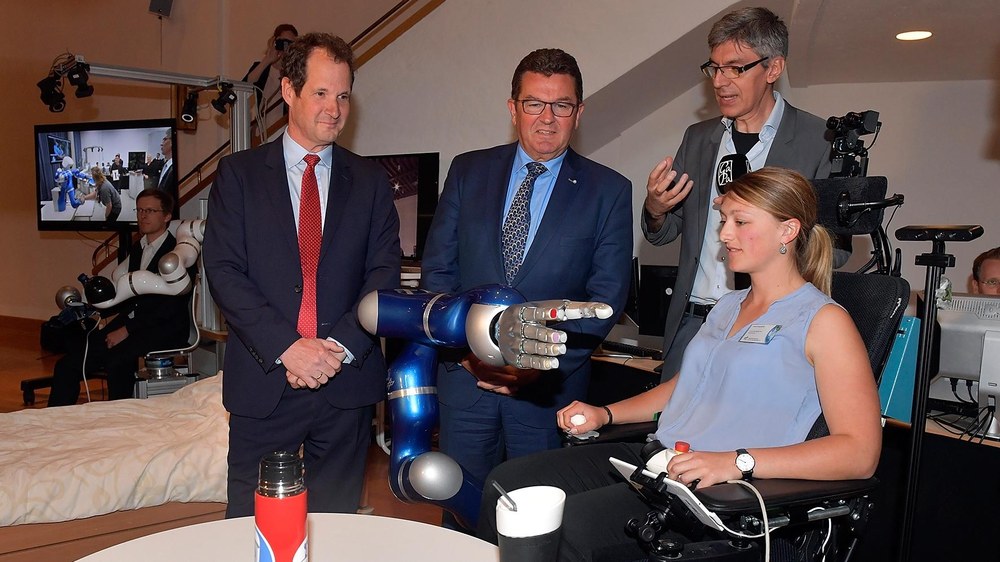Robots as care assistants for the elderly – presentation of the SMiLE project


- The aim of the SMiLE project is to enable elderly citizens and people with physical impairments to live more independent lives
- Innovative robot-based care technologies are being tested in realistic environments
- Focus areas: Robotics, space, digitalisation, society
In future, robot assistants will be able to support people at home or in care facilities if the tasks associated with everyday life become too much of a burden. Researchers at the German Aerospace Center (Deutsches Zentrum für Luft- und Raumfahrt; DLR) working on the SMiLE project have developed technologies that provide efficient daily assistance to people requiring care or with special needs. The project was presented to the Bavarian State Minister of Economic Affairs, Energy and Technology, Franz Josef Pschierer, and the general public on 7 and 8 May in Garmisch-Partenkirchen.
"The vision underlying SMiLE is to empower people to live fuller and more independent lives, despite the restrictions and reduced mobility resulting from illness or age,” explained Pascale Ehrenfreund, Chair of the DLR Executive Board. “The SMiLE robots use advanced digital technologies that have been developed during the course of space research and tested with astronauts over many years. Now they will be used to benefit the elderly."
Franz Josef Pschierer said: "Assistance robotics provides a wealth of options to support nursing staff and people requiring care. The results of the projects presented here are encouraging and clearly demonstrate that highly practical solutions can be developed through cooperation between the scientific and business communities."
Scientists from the DLR Institute of Robotics and Mechatronics research and test the innovative robotic applications in a laboratory setting, where they build hospital rooms and apartments accessible for the physically impaired.
Alin Albu-Schäffer, Director of the Institute of Robotics and Mechatronics, highlighted: "We are collaborating with the Caritas charitable organisation in Garmisch-Partenkirchen to develop scenarios for the robotic assistance of the future. The most crucial part of this project is acquiring a profound understanding of the expectations of patients and caregivers, and hence be in a position to address their most important needs. A unique environment for creating advanced future care is currently being built in Garmisch-Partenkirchen with the support of the local authority, the Bavarian Ministry for Economic Affairs and a private foundation."
Living independently despite increasing shortages in the care sector
Robot caregivers cannot and should not replace the human touch and existing care services, but they can certainly ease the burden on the nursing staff while still ensuring high-quality care. By doing so, they can make a decisive contribution to improving the quality of life of those affected and facilitating communication with family, friends and helpers. "A major target group for the project is the increasing number of single, elderly people who wish to lead independent lives in their own homes for longer. Many of them are reluctant to employ a full-time care or nursing assistant, or simply do not have the financial means to do so," explained Albu-Schäffer.
Georg Falterbaum, Director of the Caritas Association of the Archdiocese of Munich and Freising stated: "We are delighted to usher in new technologies if they ease the burden on our nursing staff, help people, and are ethically justifiable. Assistance systems that help our specialists are just one example of how digitalisation is changing everyday routines in social work. It goes without saying that nursing itself will always remain the same, but technical innovation that supports our highly qualified staff in their work also contributes to excellent quality of care."
The SMiLE robots are able to interact safely with people and help bridge the growing gap within the care sector. To do this, they use real-time 3-D image processing to recognise people and their environment, as well as for mobile applications.
The SMiLE robot team – home assistant Justin and wheelchair assistant EDAN
The SMiLE project is used to demonstrate two key scenarios; the two-armed, home-assistance robot Rollin' Justin will be used to support elderly people with moderate mobility impairments, enabling the person to enjoy an empowered life in their own home. The wheelchair assistant EDAN (EMG-controlled daily assistant) uses electromyographic control (measurement of remaining muscle activity) to help people with severe motor restrictions perform essential daily tasks within a semi-autonomous setting.
In both cases, users can draw on support from their friends and family members, who can control the robots using standard communication interfaces such as smartphones and tablets. In addition, they can also use teleoperation systems to call for professional assistance from a nursing control centre connected via powerful force-feedback devices. The methods applied in this context have already been rigorously tested in space. For instance, European, American and Russian astronauts on the International Space Station (ISS) use this technology, developed in Germany, to control robots in a wide variety of application scenarios.
